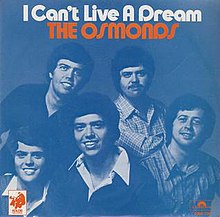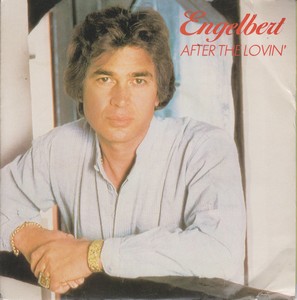
"After the Lovin'" is a single performed by Engelbert Humperdinck, produced by Joel Diamond and Charlie Calello, and composed by Ritchie Adams with lyrics by Alan Bernstein. The single was a U.S. top-ten hit in late 1976/early 1977, reaching number eight on the Billboard Hot 100 and number five on the Cash Box Top 100. It became a RIAA gold record. It is ranked as the 61st biggest U.S. hit of 1977. The song also reached number 40 on the country singles chart and spent two weeks atop the easy listening chart. It was Humperdinck's final Top 40 Billboard hit.

"Who Loves You" is the title song of a 1975 album by The Four Seasons. It was composed by Bob Gaudio and Judy Parker and produced by Gaudio. It reached number 3 on the Billboard Hot 100 in November 1975.

"Tell It to the Rain" is a song composed by Mike Petrillo and Chubby Cifelli and popularized by The Four Seasons in 1966 and early 1967. The single reached the #10 position on the Billboard Hot 100 singles chart.

"C'mon Marianne" is a song composed by L. Russell Brown and Raymond Bloodworth and popularized by The Four Seasons in 1967. Produced by Bob Crewe, the single was the last Four Seasons single to reach the Top Ten of the Billboard Hot 100 chart in the 1960s, and their last Top Ten hit until "Who Loves You" in 1975.
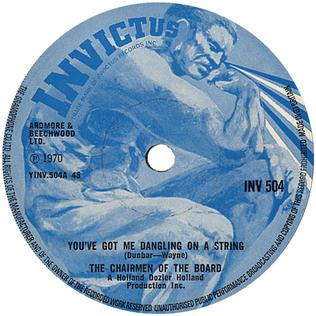
"(You've Got Me) Dangling on a String" is a 1970 soul music song by the Chairmen of the Board. The single reached No. 38 on the US Billboard Hot 100, No. 19 on the US Billboard R&B chart, and No. 5 on the UK Singles Chart. Ronald Dunbar and Edythe Wayne wrote the song.

"Love Ballad" is a song by R&B/Funk band L.T.D. Jeffrey Osborne is the lead singer.

"Cupid" is a song by American singer Sam Cooke, released on May 16, 1961. It charted at number 17 on the Billboard Hot 100 and number 20 on the Hot R&B Sides chart; the track performed best in the United Kingdom, peaking at number seven on the UK Singles Chart. The song is featured on Cooke's greatest hits album, The Best of Sam Cooke (1962). Cooke's producers had asked him to write a song for a girl they had seen on a Perry Como TV show—but once they heard her sing, they kept "Cupid" for Cooke himself.

"Love or Let Me Be Lonely" is a pop song recorded by the soul group The Friends of Distinction and released as a single in early 1970. The song was a multi-format success, peaking in the top 10 of the Billboard Hot 100 at #6 on May 1, 1970 and at #13 on the R&B chart. On the Adult Contemporary singles charts, "Love or Let Me Be Lonely" went to #9. The song is ranked as the 63rd biggest hit of 1970.
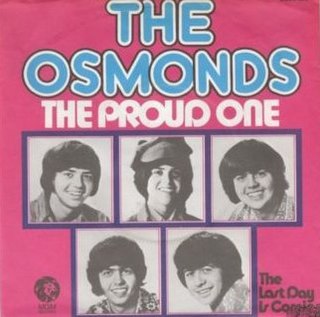
"The Proud One" is a 1966 single written by Bob Gaudio and Bob Crewe and originally performed by Frankie Valli as part of his debut solo album, The 4 Seasons Present Frankie Valli Solo. Valli's version, which featured the Seasons on instrumental backing but not vocals, peaked at #68 in the U.S. and #64 in Canada. Billboard claimed that "the electric sound of Valli is used to perfection in this powerful ballad, stating that the "easy-go dance beat [is] effective." Cash Box said that it is a "powerhouse" and that "the Valli sound holds the moving, teen-oriented tale of love together and the sweeping arrangement adds a must spin again quality to it."

"An American Dream" is a song written by Rodney Crowell. He recorded it under the title "Voilá, An American Dream" on his 1978 album Ain't Living Long Like This, and released it as the B-side to that album's single "(Now and Then There's) A Fool Such as I".

"Swearin' to God" is a song written by Bob Crewe and Denny Randell. It was recorded by Frankie Valli and released in May 1975 as a single from his album Closeup. It is a love song whose lyrical hook is a more literal use of the expression "I swear to God" :

"Almost Over You" is a 1983 single by Scottish singer Sheena Easton from her Best Kept Secret LP. It was written by Jennifer Kimball and Cindy Richardson. The single reached number 25 on the Billboard Hot 100, while its Adult Contemporary peak was number 4. In Canada, the song reached number 35 and number one on the Adult Contemporary chart.

"Sweet Life" is a song written, composed, and recorded by American singer-songwriter Paul Davis. It was the third single he released from his 1977 album Singer of Songs: Teller of Tales, and his fourth-highest peaking pop hit, peaking at #17 on the Billboard chart in late 1978. On the Cash Box chart, the song spent three weeks at #15. The song also reached #15 in Canada.
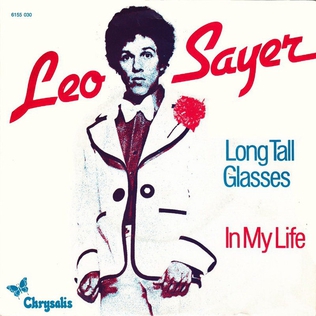
"Long Tall Glasses (I Can Dance)" is a 1974 song by Leo Sayer, co-written with David Courtney. It was released in the United Kingdom in late 1974, becoming Sayer's third hit record on both the British and Irish singles charts and reaching number four in both nations. It was included on Sayer's album Just a Boy.

"Keep Your Eye on the Sparrow", also known as "Baretta's Theme", is a song written by Morgan Ames and Dave Grusin, recorded by multiple artists during the summer of 1975. Merry Clayton's version was the first to chart, reaching #45 on the U.S. Billboard Hot 100.

"I Live for Your Love" is a 1987 song by Natalie Cole. It was the second of four charting singles from her Everlasting LP, and was also the second greatest hit from the album.

"Only You Know and I Know" is a song written and originally recorded by Dave Mason in 1970. It is a track from his LP, Alone Together. The song was his first charting single, and it became a modest hit for him in the U.S. and Canada.

"Fallen Angel" is a song by British soft rock band Rogue from their debut album Fallen Angels. Produced by band member Guy Fletcher, it was released as a single in 1975 and was a hit in the Netherlands, peaking at No. 12 on the Dutch Top 40. In the U.S., the song missed the Billboard Hot 100 by 8 places, reaching No. 108 in 1976.

"I Got to Know" is a song recorded by the American band Starbuck. It was the second of three singles from their debut LP, Moonlight Feels Right. Written and produced by Bruce Blackman, the song was released in September 1976. Like its predecessor, "Moonlight Feels Right," the song features a prominent marimba solo by co-founding band member Bo Wagner.
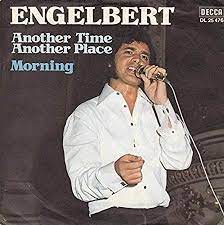
"Another Time, Another Place" is a song by Engelbert Humperdinck, the title track of his 1971 LP. It became an international hit, reaching No. 13 in the United Kingdom and No. 16 in Canada.
